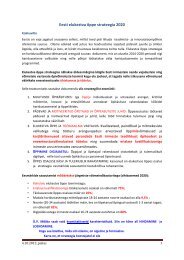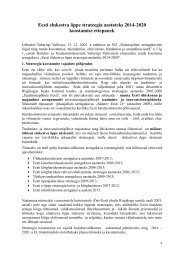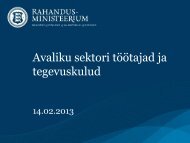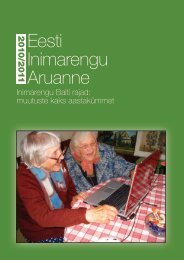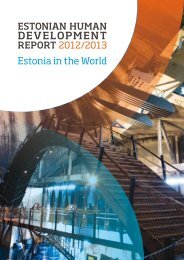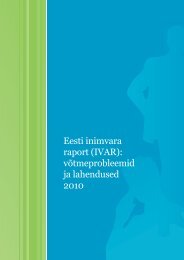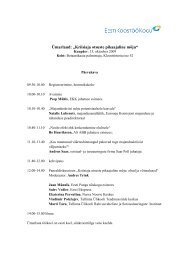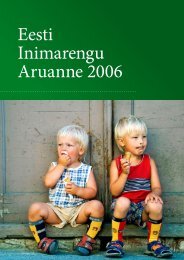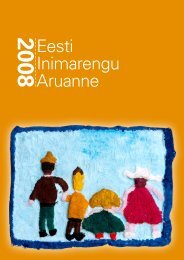Estonian Human Development Report
Estonian Human Development Report - Eesti Koostöö Kogu
Estonian Human Development Report - Eesti Koostöö Kogu
Create successful ePaper yourself
Turn your PDF publications into a flip-book with our unique Google optimized e-Paper software.
5.6. Summary<br />
To briefly summarize the tendencies and conclusions<br />
described in this chapter, we can say that the phenomena<br />
related to the development of consumer and information<br />
society in Estonia have both a positive and a negative effect<br />
on <strong>Estonian</strong> residents’ quality of life, acting simultaneously<br />
as sources of opportunities and risks. Consumerist<br />
orientations tend to increase satisfaction with life and provide<br />
opportunities for the construction of identities and<br />
shaping of lifestyles. At the same time, excessive and irrational<br />
consumption and borrowing are not sustainable,<br />
causing many individuals to borrow beyond their means<br />
and become insolvent, while also increasing various environmental<br />
risks. The effect of the consumer society on<br />
children and young people is also two-sided. Most children<br />
in Estonia receive an allowance from their parents,<br />
which allows them to make independent decisions related<br />
to consumption and saving money. However, a significant<br />
level of inequality in terms of the amount of pocket money<br />
received is evident already in the case of children aged 11–<br />
14 and there is a considerable degree of school bullying<br />
based on the clothes and appearance of schoolmates taking<br />
place in primary school.<br />
Information and communication technologies have<br />
become an integral part of the daily lives of most <strong>Estonian</strong><br />
residents. Increasingly, new media allows people to satisfy<br />
their need for information, entertainment, and selfexpression,<br />
while also providing more and more opportunities<br />
for democratic participation. Estonia’s relatively<br />
high position in the international rankings related to the<br />
development of e-technologies does not allow us to become<br />
complacent and halt our progress, because with regard to<br />
the implementation of ICT innovations to increase actual<br />
competitiveness and democratic citizenship we are lagging<br />
behind many countries. In addition, the widespread use of<br />
the Internet by <strong>Estonian</strong> children and young people does<br />
not have an unambiguously positive effect on their quality<br />
of life, competitiveness, and development into active<br />
citizens capable of critical thought. <strong>Estonian</strong> children also<br />
lead the pan-European charts in terms of experiencing<br />
risks related to the Internet and most young people aged<br />
15–19 use the Internet primarily for the purpose of entertainment<br />
and communication. Online content creation,<br />
a phenomenon potentially conducive to involvement and<br />
influence of consumer society on young people as well as<br />
to an indifferent attitude towards the environment. Thus,<br />
among <strong>Estonian</strong> youth satisfaction with life is somewhat<br />
higher in the case of young people who are less critical of<br />
their consumption opportunities, who take the problems<br />
of the consumer society for granted, and who attribute little<br />
importance to environmentally friendly consumption.<br />
In the case of the oldest age group, however, the subjective<br />
well-being is highest among those who are able to and<br />
want to exercise environmentally friendly consumption.<br />
In the light of the pattern of connections described<br />
above, we can interpret the relationships between the<br />
quality of life and aspects of consumer and information<br />
society from the standpoint of social adaptation which<br />
gives rise to two types of assessments. On the one hand,<br />
we see that fast adaptation to the development of information<br />
and consumer society, which includes active and<br />
versatile Internet use, consumerist orientation, being<br />
informed about events taking place in the society, has<br />
a positive effect on quality of life in terms of subjective<br />
well-being. In addition, the feeling of “not missing the<br />
boat” plays an especially important role in the satisfaction<br />
with life of middle-aged and elderly people. On the<br />
other hand, there exists the danger of successful adaptation<br />
to social changes causing a tendency to accept<br />
problematic phenomena as natural and thereby bringing<br />
about their normalization, especially in the eyes of the<br />
youngest generation. If social adaptation causes a lack<br />
of critical sense and the spread of indifference, it should<br />
be seen primarily as social accommodation which, at the<br />
level of the society, brings about a decrease in solidarity<br />
and cohesion.<br />
participation in civic society, is also dominated by activities<br />
aimed at communication and identity creation, while<br />
voicing opinions online and commenting on the opinions<br />
of others is relatively uncommon among young people.<br />
Young people themselves are relatively uncritical of<br />
several problems related to children and young people in<br />
the information and consumer society, tending to take<br />
these phenomena for granted or being unwilling or unable<br />
to provide any reflexive evaluation at all of their peers’<br />
social practices. <strong>Estonian</strong> parents stand out in the context<br />
of average EU indicators in terms of their unfounded optimism<br />
with regard to online risks related to children. Our<br />
parents are also among the least active in Europe in terms<br />
of counselling and monitoring their children’s Internet<br />
use. Awareness of the significant aspects of consumer competence<br />
is in its early phase both in the case of older generations<br />
and young people themselves. This means that the<br />
phenomena and problems related to children and young<br />
people in the information and consumer society merit a<br />
more thorough approach and discussion, both among the<br />
general public and within the third sector.<br />
The current economic crisis is likely to have a negative<br />
effect on the development of the consumer and information<br />
society. Despite the fact that private consumption is a significant<br />
factor in economic growth, it would be immoral<br />
to call for people to engage in more consumption indiscriminately.<br />
Instead, more attention should be attracted to<br />
well-informed consumption choices that coincide with the<br />
interests of the <strong>Estonian</strong> economy, conservation of the environment,<br />
and people’s health, for example, products manufactured<br />
in Estonia, environmentally friendly products,<br />
organic foodstuffs, people’s own health, and the education<br />
of children. The main issues that should be considered<br />
during difficult times and addressed with suitable action<br />
strategies include the problem of socializing young people<br />
and training adults to be socially active, instilling in them<br />
a healthy sceptical attitude and clarity of thought, as well<br />
as the capacity to take a critical approach, if necessary. It<br />
should be our aim to educate consumers and users of the<br />
new media who are skilled in using all of the opportunities<br />
available to them while avoiding the risks involved, skilled<br />
in making competent decisions and standing courageously<br />
for their own rights and public interests.<br />
| 124



